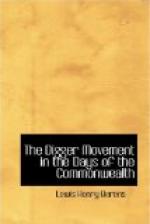“The main thing that you should look upon is the Land, which calls upon her children to be free from the entanglements of the Norman Taskmasters. For one third part lies waste and barren, and her children starve for want, in regard the Lords of Manors will not suffer the poor to manure it.... The power is in your hands, the Nations Representative, O let the first thing you do be this, to set the land free. Let the Gentry have their enclosures free from all enslaving entanglements whatsoever, and let the Common People have the Commons and Waste Lands set free to them from all Norman enslaving Lords of Manors. That so both Elder and Younger Brother, as we spring successively one from another, may live free and quiet one by and with another in this Land of our Nativity.” “This thing,” he then boldly declares, “you are bound to see done, or at least to endeavour it, before another Representative force you; otherwise you cannot discharge your trust to God and man.” And the Appeal concludes with the following words: “Set the Land free from oppression, and righteousness will be the Laws, Government, and Strength of that People.”
The Long Parliament, however, were too busy carrying English civilisation into Ireland to heed his words. And yet surely there was work enough for them to do in their own country, in which, as we have already pointed out, since the reign of Henry the Seventh the condition of the masses of the people had steadily worsened, and, as a natural consequence, the number of beggars, “rogues and vagrants,” despite barbarous laws, involving their wholesale hanging, had steadily increased. During the reign of James the First, in a pamphlet entitled Grievous Groans of the Poor, published 1622, we hear the complaint that “the number of the poor do daily increase.” The only remedy the then wise men of England could devise was to make the laws against them still more severe. Consequently it was ordered that the first time such people were apprehended they should be branded with the letter R, and if subsequently again found begging or wandering they were “to suffer death without benefit of Clergy.” Yet such was their obstinacy that they still increased in numbers; and that for the simple reason that the economic or social causes of which they were but the inevitable outcome were not removed.
During all this period, however, the country was developing, its industry and commerce expanding, and its wealth increasing by leaps and bounds; but in all this the “meaner sort,” the Younger Brothers, the disinherited masses, had neither lot nor share. Though Clarendon may speak of the growing economical prosperity of the country during the time of which we are writing, yet there be no doubt of the truth of Thorold Rogers’ contention, that[109:1]—“I am convinced from the comparison I have been able to make between wages, rents and prices, that it was a period of excessive misery among the mass of the people and the tenants, a time in which a few might have become rich, while the many were crushed down into hopeless and almost permanent indigence.” And yet the facts are such as to compel him, when speaking of the Restoration, to point out that[110:1]—“the labourers, as far as the will went, were better off under the rule of the Saints than under that of the sinners.”




